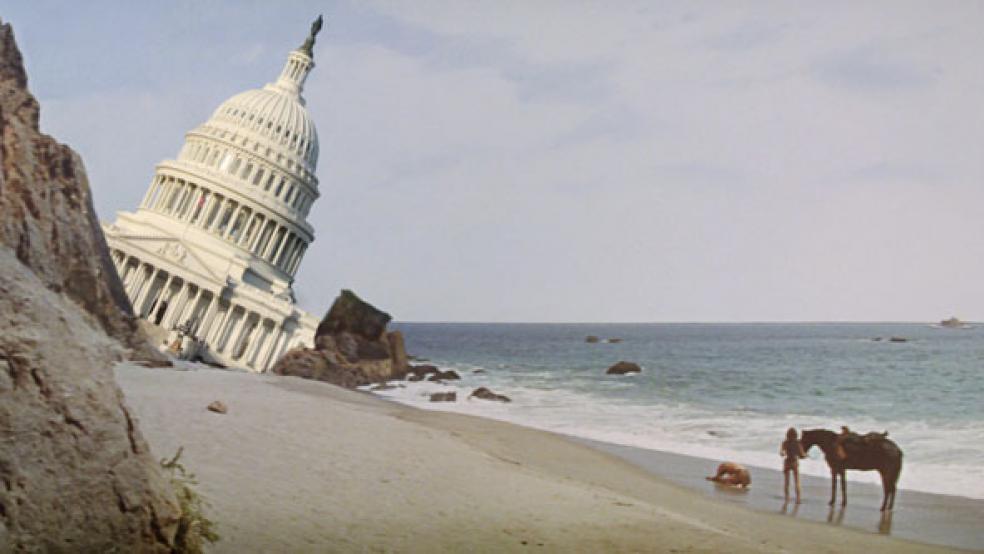Much of southern Louisiana is still under flood water. Flint, Michigan residents still can’t drink their city’s lead-contaminated water. And members of Congress are so heavily conflicted over how and when to respond to those two disasters that they are risking a government shutdown by the end of the week.
Lawmakers at one time had high hopes of quickly tying up loose ends and then head for the door at the end of the week to return home to campaign. But Congress’s legendary dysfunction was on full view on Tuesday, as Senate Republican leaders tried again and failed to pass a massive stop-gap spending bill to keep the government operating beyond the start of a new fiscal year October 1.
Related: Congress Flirts With Another Government Shutdown as Election Looms
After wasting a good part of the summer out of town on an extended recess without having passed a single appropriations bill or addressing the year-long Zika virus crisis in Florida and Puerto Rico, lawmakers returned to work last week determined to make short order of all outstanding business.
Yet now they find themselves ensnared in another financial crisis of their own making. This one has to do with when and how to finally approve critically need federal assistance to Louisiana, which is reeling from the worst natural disaster since Hurricane Sandy in 2012, and Flint, the economically depressed and largely black city struggling to function with no potable water and the terrible knowledge that 6,000 or more young children may have incurred serious health problems by drinking the water.
Senate Majority Leader Mitch McConnell (R-KY) and House Speaker Paul Ryan (R-WI) are in no mood for another government shutdown so close to the November 8 election – one that would likely anger constituents and be blamed on the GOP leadership.
But irate Democrats led by Senate Minority Leader Harry Reid and House Minority Leader Nancy Pelosi, have vowed to continue to block passage of a continuing resolution necessary to keep the government afloat unless it contains $220 million in emergency assistance to Flint and other communities with problems of contaminated drinking water.
Republicans for months have dragged their feet on approving emergency funding for Flint for eight months, despite the national outrage over the EPA and Republican state officials’ gross mishandling and cover-up of the contaminated water system. Michigan Sens. Debbie Stabenow and Gary Peters, both Democrats, fought to get the money including in the continuing resolution, along with $500 million of emergency relief for bedraggled Louisiana residents and businessmen.
Related: The Senate Dithers Again as Zika Virus Continues to Spread
But Republicans have insisted on treating the Flint funding differently by including it in the 2016 Water Resources Development Act recently approved by the Senate, but that still awaits action in the House. While McConnell backed inclusion of the Flint funds in the Senate-passed version, Ryan and House conservatives are balking at including the money in their version of the water resources bill.
The House conservatives’ motivation in slow-walking emergency assistance for a Midwestern city poisoned by lead is anybody’s guess.
But Senate and House Democratic leaders are determined to block action on the CR until they receive assurance that the Flint money will be approved this fall, one way or another. During a news conference on Tuesday, just prior to McConnell’s latest failed effort to win cloture on a stop-gap spending measure, Stabenow, Peters and a handful of other Michigan lawmakers warned they would risk provoking a fiscal crisis to get the Flint money approved.
Stabenow said that Flint residents have been consigned to unspeakable health problems and inconvenience, and that Congress has been jerking them around for months until the Senate finally overwhelmingly approved the funding last week as part of the water resources legislation.
“At 95 to 3, we thought we were finally on our way, and the people of Flint were hopeful,” she told reporters. The funding then ran into a brick wall in the House, she said. And at the same time, the disaster relief for Louisiana was added to the continuing resolution.
“Now I’m happy to support Louisiana,” Stabenow said. “I’ve said that from the very beginning. I understand about flooding. We just ask that the Republicans in the House and the Senate understand lead poisoning in water – shutting down an entire city’s water supply of 100,000 people who have waited too long . . .If in fact the people of Flint have to wait again, then the people of Louisiana can join them in that wait until the end of the year.”
Related: How the Flint Drinking Water Crisis Became a Political Punching
Rep. Sander Levin (D-MI), a veteran legislator, warned that “We’re here to say, if the money is not provided before we leave this week, we’re not leaving.” Peters added that “The people of Flint need help.”
McConnell is exploring a number of options to break the logjam in the Senate and House before Friday’s deadline for a shutdown. One possibility is a Solomon-like maneuver of dropping both Flint and Louisiana from the continuing resolution through Dec. 9 and then trying to reach a final agreement on the emergency funding during the lame duck session after the election.
McConnell floated that idea at a news conference shortly before the latest procedural vote to bring up the continuing resolution failed, 45 to 55, according to Politico.
"We keep hearing that their position is no Flint, no floods," McConnell said. "That's certainly an option worth discussing." When told of McConnell’s comment, Reid, the Democratic leader who retires at the end of this year, said he wanted to see precisely what McConnell would do – and again said he wanted to see relief approved for both Louisiana and Flint.





